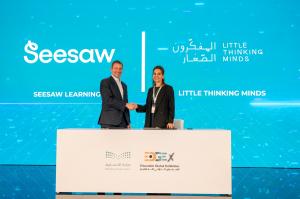Seesaw Acquires MENA-based Edtech Startup Little Thinking Minds to Expand Learning Solutions Globally
Seesaw Acquires MENA-based Edtech Startup Little Thinking Minds to Expand Learning Solutions Globally
Seesaw offers a suite of award-winning interactive and AI-driven learning tools and digital curriculum products designed to enhance student engagement, facilitate real-time assessments, and strengthen school-home communication. With this acquisition, Seesaw will combine its interactive technology with Little Thinking Minds’s evidence-based Arabic literacy curricula and assessment solutions in order to transform learning for PreK-12 students, educators, and families in the MENA region and beyond. In addition to its comprehensive solution set for American and British schools, Seesaw will launch its first Arabic-language platform in 2026, reinforcing its commitment to authentic and multilingual learning experiences.
Together, the two companies will enable educators to create joyful, inclusive, and personalized learning experiences, ensuring that every student is supported throughout their academic journey. Ministries and school leaders will benefit from data-driven insights through Seesaw’s interactive dashboards and student portfolios, offering a clearer view of student progress and learning outcomes.
.
“This partnership marks a major step in our mission to create engaging and effective learning experiences for students worldwide,” said Matthew Given, CEO of Seesaw. “Little Thinking Minds has built a strong reputation and effective products for improving Arabic literacy, and by joining forces, we can empower more students and teachers with localized, high-impact learning solutions.”
Founded in 2004, Little Thinking Minds is a pioneering edtech startup dedicated to closing the literacy gap for Arabic-speaking students worldwide, with a strong focus on the MENA region. Through its platforms—I Read Arabic, I Start Arabic, and the Mizan Assessment Platform—the company has empowered over 400,000 students across 10+ countries with evidence-based digital literacy solutions. Backed by independent research, LTM’s programs have demonstrated a 25% improvement in literacy levels and are trusted by public and private schools, refugee education programs, and government initiatives to deliver measurable outcomes.
Little Thinking Minds has established itself as one of the strongest edtech startups in the region, successfully attracting investors and securing significant funding. In 2018, the company raised a Series A investment led by Algebra Ventures, with participation from Mindshift Capital, Al Turki Ventures and the ISSF Fund. This funding — along with support from early investors including the Women’s Angel Investor Network (WAIN) and Oasis500 — allowed Little Thinking Minds to scale its platform, expand its reach, and further develop its Arabic literacy solutions, solidifying its role as a leader in the MENA edtech ecosystem.
“We’re incredibly proud to be joining the Seesaw family,” said Rama Kayyali, co-founder and CEO of Little Thinking Minds. “As the leading Arabic language K-12 edtech in the region—with curriculum alignment across most Arab countries, a strong footprint in both public and private schools, and pioneering research and development in AI for Arabic literacy—this milestone represents a powerful next step in our mission. Together with Seesaw, we’re poised to scale our impact even further, delivering cutting-edge, culturally relevant learning experiences that empower children across the MENA region and beyond.”
This acquisition – originated with EDT&Partners – is a significant development in the MENA edtech ecosystem, reinforcing Seesaw’s commitment to multilingual education and expanding its reach into Arabic-speaking markets. Seesaw and Little Thinking Minds currently serve over 800,000 users at over 3,000 schools, ministries, and school groups in the MENA region and will now look to rapidly expand their global reach with their combined solution set.
For More Info
Communications
email us here
Legal Disclaimer:
EIN Presswire provides this news content "as is" without warranty of any kind. We do not accept any responsibility or liability for the accuracy, content, images, videos, licenses, completeness, legality, or reliability of the information contained in this article. If you have any complaints or copyright issues related to this article, kindly contact the author above.
Learning to Homebrew Spotlights 2025’s Must-Brew Summer Beer Styles & Trends
Les IAs Bas Carbone certifiées COP29 de GenerIA répondent en tous points aux recommandations exprimées par l’UNESCO
Caliber Metal Surpasses 25,000 Roofing & Siding Jobs Supplied, Backed by Network of Trusted Installers
Więcej ważnych informacji
 Jedynka Newserii
Jedynka Newserii

 Jedynka Newserii
Jedynka Newserii

Problemy społeczne

Sukces gospodarczy Polski może zachęcić do powrotów Polaków mieszkających za granicą. Nowa rządowa strategia ma w tym pomóc
Polska coraz mocniej stawia na powroty swoich obywateli z zagranicy. Rządowa strategia współpracy z Polonią na najbliższe lata zakłada system zachęt dla osób powracających, ale też ułatwienia w uznawaniu wykształcenia i kwalifikacji, podejmowaniu studiów czy staży zawodowych. To w obliczu rosnących wyzwań demograficznych i zapotrzebowania na wysoko wykwalifikowaną kadrę szansa na wzmocnienie rynku pracy. Napływ wykwalifikowanych specjalistów z doświadczeniem zdobytym za granicą może pomóc w modernizacji krajowej gospodarki.
Prawo
ZPP: Działania administracji narażają na szwank wysiłek deregulacyjny. Niektóre niosą znamiona dyskryminacji i nękania przedsiębiorców

Choć rząd zgodnie z zapowiedziami realizuje szeroko zakrojone zmiany deregulacyjne, przedsiębiorcy alarmują, że brakuje w nich spójności, przewidywalności i realnej poprawy, zwłaszcza w kontaktach z administracją. Jako przykład ZPP podaje przypadek firmy British American Tobacco (BAT) i jej zatrzymanego przez izbę celno-skarbową zamówienia 200 tys. kartridży do e-papierosów. Dotknięte tą decyzją spółki liczą straty.
Konsument
Branża piwowarska dodaje do polskiej gospodarki ponad 20,5 mld zł rocznie. Spadki sprzedaży i produkcji piwa uderzają również w inne sektory

Branża piwowarska pozostaje ważnym ogniwem polskiej gospodarki. Nowy raport CASE wskazuje, że generuje ona 3 proc. dochodów budżetowych i 85 tys. miejsc pracy w samych browarach i innych powiązanych sektorach. Dlatego kurczący się rynek piwa może mieć poważne reperkusje – już dziś nadwyżka mocy produkcyjnych przekracza 10 mln hl. Spadki są spowodowane m.in. znaczącym wzrostem kosztów działalności, spadkiem konsumpcji, a także uderzającymi w browarników zmianami regulacyjnymi.
Partner serwisu
Szkolenia

Akademia Newserii
Akademia Newserii to projekt, w ramach którego najlepsi polscy dziennikarze biznesowi, giełdowi oraz lifestylowi, a także szkoleniowcy z wieloletnim doświadczeniem dzielą się swoją wiedzą nt. pracy z mediami.









.gif)

 |
| |
| |
|